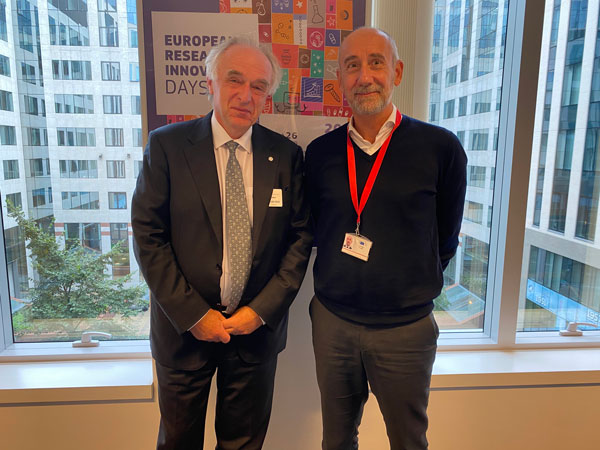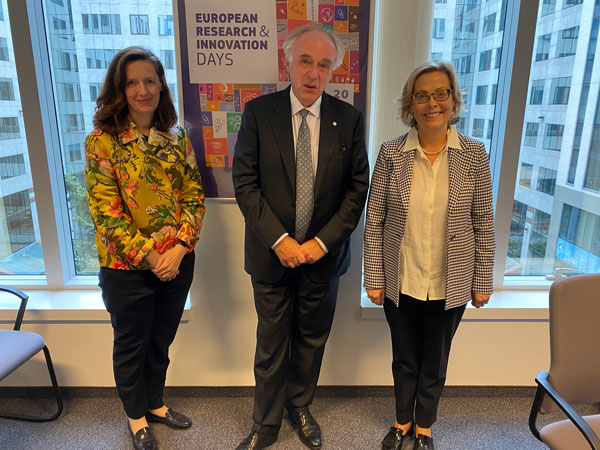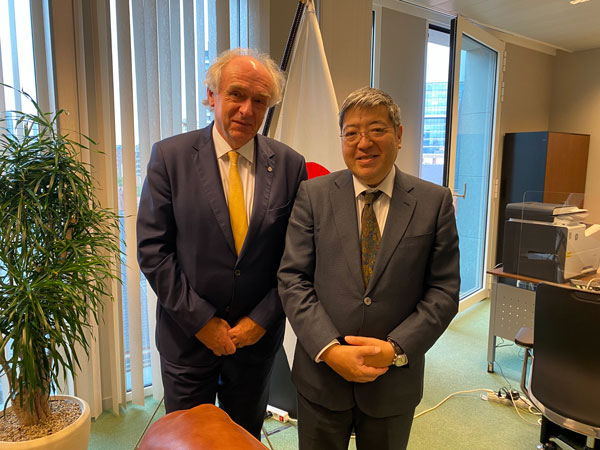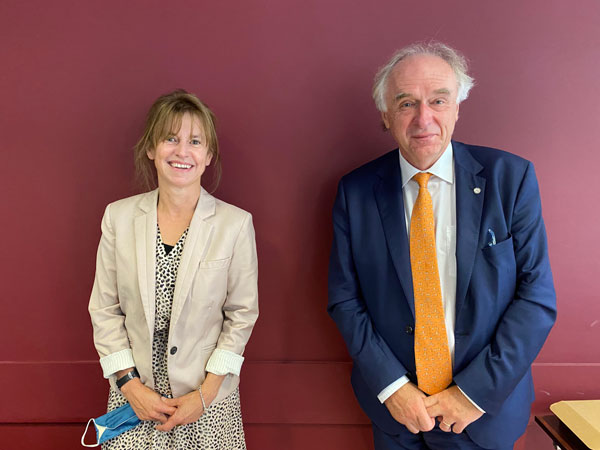Secretary-General, Pavel Kabat, visited Brussels from 12th to 14th October for meetings with leadership of the European Commission, members of the HFSPO Board of Trustees, diplomatic missions and several agencies of the Belgian government. He thanked the Commission for its continued and sustained support of HFSPO, and presented a report summarizing 30 years of exceedingly successful collaboration between the European Commission and HFSPO. Since 1990, a total of 583 young scientists from European countries have been supported by HFSP postdoctoral fellowships and some 435 investigators have received support for intercontinental collaborations via HFSP research grants. European research institutions have also been successful in attracting foreign scientists supported by HFSP postdoctoral fellowships. Between 1990 and 2021, the European Commission has contributed USD 108 M to HFSPO, while European researchers have won research grants and fellowships for a total USD 247 M.
The Secretary-General presented an outline of a new HFSPO strategy to revitalise the Program for the next decade. The Board of Trustees will discuss and develop this strategy in the coming months, to be agreed at the Triennial Conference of HFSPO Members (TCHM) in June 2022.

Pavel Kabat and Jean-Eric Paquet
Jean-Eric Paquet, Director-General Research and Innovation at the European Commission, and HFSPO Trustees, Signe Ratso and Henriette van Eijl confirmed the full commitment and support of the European Commission to HFSPO in the future. They discussed future collaboration and how the European Commission could contribute to developing the new strategy and preparing the upcoming TCHM. They also discussed the possibility of individual EU countries participating in HFSPO and agreed to participate in a possible HFSPO segment of a high-level international science cooperation meeting in March 2022 in Marseilles, championed by the French government, under the French presidency of the Council of the European Union, and in support of the new Global Approach to Research and Innovation by the European Commission.

Henriette van Eijl, Pavel Kabat and Signe Ratso
At a meeting with Ambassadors Yasushi Masaki and Hiroaki Fujiwara, the Mission of Japan to the European Union, the Secretary-General showed his deep appreciation of Japan’s continued support to HFSP for more than 30 years and shared his vision for increasing HFSPO member countries and for promoting the Program as a tool for science diplomacy. He also confirmed his upcoming visit to Japan in January 2022 and asked for the Ambassadors’ assistance in preparing high level meetings with the Japanese government. Ambassador Masaki promised his support for the visit and noted that the new Prime Minister, Fumio Kishida, was the former Minister of State for Science and Technology and Minister for Foreign Affairs, with long-standing experience in science diplomacy. The Ambassador also promised to convey the Secretary-General’s request for support in working towards the forthcoming TCHM.

Pavel Kabat and Ambassador Yasushi Masaki
In addition, the Secretary-General visited officials at the French representation to the European Union, the European Research Council Executive Agency and the RIKEN EU Office. He also met with Véronique Halloin, Secretary General of the Fund for Scientific Research (F.R.S.-FNRS), Jo Bury, Managing Director of VIB – Flanders Institute for Biotechnology , and an official of the Government of Flanders, discussing with each of them the possibility of future collaboration.

Véronique Halloin and Pavel Kabat
| The Human Frontier Science Program (HFSP) is unique, supporting international collaboration to undertake innovative, risky, basic research at the frontier of the life sciences. Special emphasis is given to the support and training of independent young investigators, beginning at the postdoctoral level. The Program is implemented by the International Human Frontier Science Program Organization (HFSPO), supported financially by Australia, Canada, France, Germany, India, Israel, Italy, Japan, the Republic of Korea, New Zealand, Singapore, Switzerland, the United Kingdom of Great Britain and Northern Ireland, the United States of America, and the European Commission. Since 1990, over 7000 researchers from more than 70 countries have been supported. Of these, 28 HFSP awardees have gone on to receive the Nobel Prize. |


































